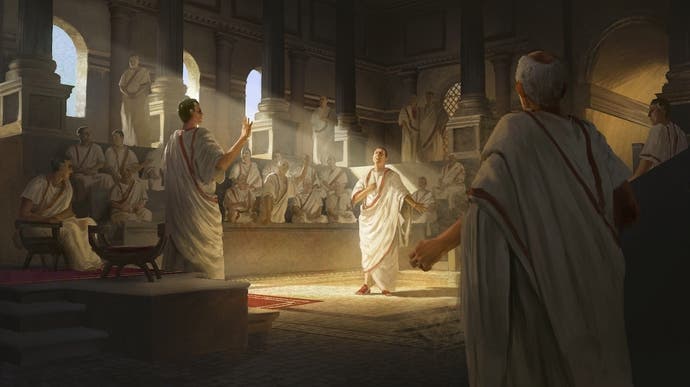Imperator: Rome review - a smart grand strategy that lacks the spark of Paradox's other efforts
Biggus clickus.
What is it about the Roman empire that makes it so enduringly fascinating, when other historical empires eclipse it in so many ways? There have been bigger empires (British), older empires (Persian), and more ferocious empires (Mongol). Yet few people ever talk about what the Mongols did for us.
I partly answered my own question by using the word "Empire" which is of course derived from Latin. Despite having collapsed over 1500 years ago, Rome's cultural influence remains part of our lives in everything from language to religion. But I think a more comprehensive answer lies in another Latin-derived word - "Romance". When I think of the British Empire, I think of belching smokestacks, tea, and a fat old woman dressed in black. When I think of the Roman Empire, I think of mad emperors, gladiators, assassinations, and red.
I'm aware that's not an accurate portrayal of either period, but the colour of Rome remains startlingly vibrant in a way that no other historical empire does, and it's this colour that Imperator sadly lacks. Paradox's latest strategic colossus is possibly its grandest yet. Yet despite being literally about painting the map in SPQR scarlet, its representation of the period feels oddly cold and sterile, more interested in percentages than populi.
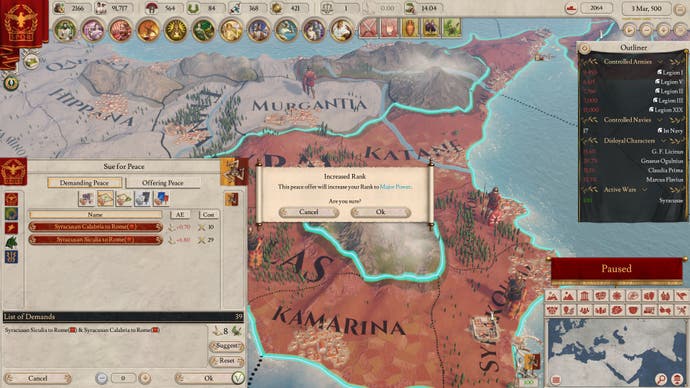
This is not to say that Imperator doesn't try. Oh boy does it try, to the point where the straining may be part of the problem. The rough goal of Imperator is to take the statecraft of Europa Unversalis and forge an alliance with the more domestic drama of Crusader Kings. Unfortunately it's an alliance from which the former overwhelmingly benefits, while the latter is at best an innocuous extra, and at worst an outright inconvenience.
As you'd expect from a Paradox grand strategy, it's also phenomenally complicated. Paradox has (again) attempted to improve the accessibility of Imperator, with a more in-depth tutorial leading you into a campaign, and explanatory tooltips for most menus, actions, resources, and so forth. But it still feels like putting a plaster on a severed limb, because there is simply so much to get your head around.
When Imperator is posing flexible problems like this, it's engrossing. At times, however, it can be like a fussy Dungeon Master.
To give you a taste of what I'm talking about, Imperator lets you play as any state on its enormous map, which ranges from the frozen woodlands of northern Scotland to the tropical heat of the Indian subcontinent. The game recommends five nations to play as, namely Egypt, Phrygia, Macedon, Carthage, and of course Rome itself (which is the nation I spent most of my time with).
Whomever you choose to play as, you're going to be managing everything about that state. Most obviously, you're going to be moving armies around and annexing territory from other nations either through force or diplomacy. But there's also a government to manage with eight different positions, occupied by the various noble families of your state. There are five different resources to manage, each of which relates to a different area of your nation (economy, military, religion and so forth). There's a complex import/export system with around two-dozen different goods, each of which has different effects depending on whether you import or export it (and whether those imports/exports are provincial or for your state capital). Every territory has four different types of population which you need to manage, whose overall happiness affects things like local unrest, taxation, commerce, and your ability to research new technologies. There's a religion system based around Omens, which you can call down to give you a significant edge in everything from taxation to tyranny. There's even a whole legal system where you can change laws to suit your current Imperial needs.
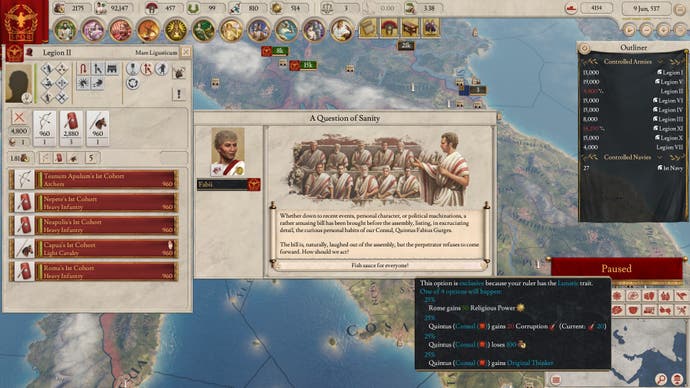
If you're new to Paradox games (I'm not, but it has been a little while), the initial impression is like being sat down in the command module of a space rocket. There are buttons and dials everywhere and you're terrified of touching them in case something explodes. The point of all this stuff, however, is to generate interesting problems for you to solve, which Imperator does very well. Once you figured out what everything does, the game provides an almost-constant drip-feed of "How do I achieve X without Y happening?" scenarios.
The most immediate of these is 'How do a build a nice big army without crippling my economy'? Imperator's economy management has many different threads to it, with everything from taxation to trade to the output of your nation's slaves potentially affecting the balance of your coffers. Gradually unpicking this problem is very satisfying. Conquering more territory obviously gives you more coin from tax, trade and commerce, but there are also laws you can enact and technologies you can unlock that help to boost your income or reduce your expenses.
The more interesting X/Y scenarios, however, occur both between nations, and between your own state and its government. When playing as Rome, for example, you can't declare war on another nation unless at least half the Senate support it. You can just buy the seats you need to get a literal thumbs-up, but doing so incurs tyranny, which causes unrest and leads you one step further down the road to dictatorship (which, playing as Rome, of course, is something you might actively pursue) Alternatively, you can wait for an election or another party to offer support. But accepting it will mean you owe them a favour that they can call in an any time.
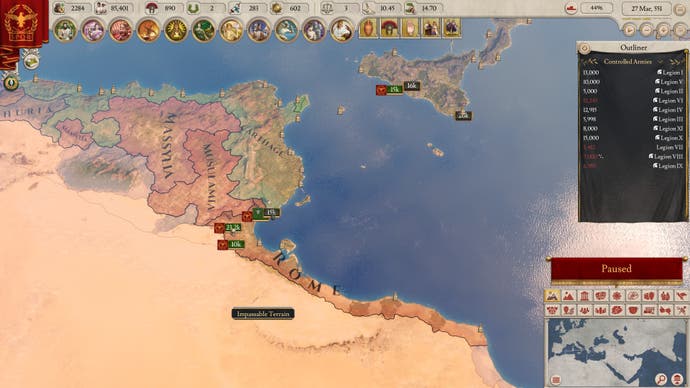
Imperator is at its best at the broadest scale, when you're trying to figure out how to dismantle two of the other greatest empires of the ancient world, while also dealing with literally dozens of different tribes from Germania and Cisalpine Gaul. The game is carefully balanced to make you feel like you're never quite ready for the next big challenge. Even a moderate Gallic tribe occupying a single province can give your legions a battering if you aren't careful, while taking on the full might of Carthage from across the Mediterranean is a daunting task due to their superior naval capability. One potential solution is to establish a beachhead by conquering a smaller North African tribe, then gradually push West to nibble at the Carthaginian underbelly, either attacking their allies or trying to snip off a province or two before they can call the full weight of their forces down on you.
When Imperator is posing flexible problems like this, it's engrossing. At times, however, it can be like a fussy Dungeon Master, peering over its foldout screen and saying "Ah, you can't do that actually," because of some obscure rule. Case in point, I spent half an hour smashing one of Carthage's southern allies into sandy mulch, only to discover I couldn't conquer the territory as it wasn't directly connected to the coast, even though it was connected to my Empire.
I was never bored playing Imperator, but I was never exactly thrilled either.
Nonetheless, as an enormous, ever-shifting mathematical puzzle, Imperator is sound as a round denarius. As an evocation of the period, however, Imperator is distant and staid. As with Crusader Kings, your government is formed from what is essentially an aristocratic court, be it your tribal chieftains or the "Citizen" families of Rome. Citizens expect to be given important roles as generals or politicians so they can fill their coffers and fulfil their duty to Rome. If they don't get them, they consider themselves "scorned", which gradually decreases their loyalty to the current Consul (or Emperor).
This can have some interesting consequences. For example, a disloyal general might ignore your orders and piss off to do his own thing with your army, while disloyal politicians might ultimately incite a bitter civil war. Alongside this is a regular stream of semi-random events, which usually offer several ways to resolve them. One example involves a governor being caught with his hand in the Republican cookie jar. You can choose to have him publicly flogged (which if they're elderly or infirm might kill them outright) or quietly sweep the incident under the rug, incurring corruption upon to your current consul.
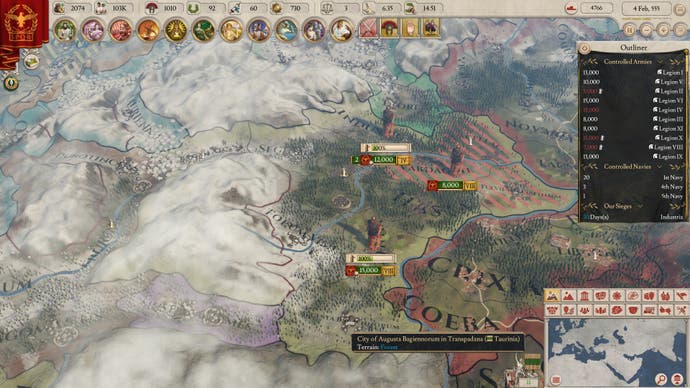
In theory, all of this is great. But these character dramas and events rarely make much of an impact. The scale that Imperator plays at, with a single year lasting approximately three minutes, leaves little room for characters to embed themselves in your memory. Your government's consuls and party leaders are dying almost constantly, to the point where I ran out of individuals to command my armies and fill key government posts.
As a result, all the rivalries and political gamesmanship simply don't matter, because nobody's around long enough to make the difference. Things change somewhat if you reconstitute your government into a dictatorship, where leaders rule for life and can only be removed through conquest or assassination, but it's still very much a background element that, if you're Rome at least, doesn't come into play until fairly late in the game. It says a lot that most of Imperator's character is found in its map, which is pretty and diverse and evolves over time as cities grow and roads are constructed.
I was never bored playing Imperator, but I was never exactly thrilled either. Navigating its many cogs and gears to achieve the outcome you want is always engaging, but it doesn't have the crazy highs of Crusader Kings or the weirdness of Stellaris. It's easy to appreciate and hard to like - the Domitian of grand strategies.
